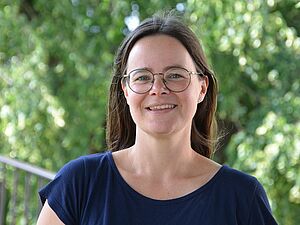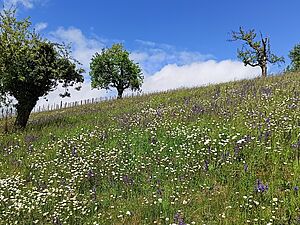"More flexibility and autonomy increase motivation"
Voices on biodiversity
Meadow with bulbous oat grass containing a variety of species and flowers: these moderately nutrient-rich soils are often home to well over 30 plant species. (Photo: Agrofutura)
Rebekka Frick is a social scientist and has been working at FiBL Switzerland in the Department of Food System Sciences for eight years. She conducts research on the transformation of agricultural and food systems with a particular focus on the actors involved, their interests and the necessary changes to the framework conditions.
In Switzerland, the federal government supports biodiversity in agriculture with biodiversity subsidies. However, despite the current support measures, biodiversity in Switzerland is steadily declining. Challenges resulting from the species going extinct also affect agriculture. One promising approach is the targeted promotion of biodiversity. This involves promoting biodiversity on the farm autonomously and on an area-specific basis. This system gives farmers more freedom, but also more risks.
Up to now, farmers have received biodiversity subsidies based on their compliance with measures such as not using fertilisers. The target-oriented approach focuses on the quality of the land, which determines the amount of the subsidies. Farmers decide for themselves which measures they implement to improve or maintain quality.
This approach is currently being tested on 29 farms in the canton of Zurich in the ZiBiF (target-orientated biodiversity promotion) pilot project. Advisors support the participating farmers. They look at the various areas together and discuss their potential for development. In an agreement, they set out area-specific and location-adapted goals to guide them in their choice of measures. Concrete goals could be, for example, establishing a bulbous oat grass meadow with its typical species or a hedge with valuable species and structure.
FiBL Switzerland’s role in the project is to provide advice and scientific support. As part of the scientific support, we are investigating, for example, what motivates farmers to participate in the targeted promotion of biodiversity. Two aspects that participating farmers have particularly emphasised so far: Flexibility and autonomy.
Flexibility is reflected in the ability to adapt measures to the location and thus improve their effectiveness. It also means that promoting biodiversity can be better integrated into everyday farm life, as farmers can choose the type and timing of the measure themselves. Further, there are more options for linking biodiversity with production. Farmers also appreciate being able to try out something new.
Greater autonomy in promoting biodiversity is an important matter for the participating farmers. The mere fact that they can decide for themselves what they do for biodiversity, how and when, motivates them to participate in the ZiBiF project. They also appreciate the fact that their own knowledge of biodiversity and their experience with its promotion on their land are highly relevant and that they can utilise it directly. They like expanding their knowledge, especially through the specific advice, which is adapted to the location as well as to the farm and the farmers.
The pilot project shows that it is worth looking at biodiversity promotion not only from the perspective of financial incentives. Financial compensation is key -– no doubt about it. However, our research shows that self-determination and flexibility are also key motivators for promoting biodiversity.
The project sponsors are made up of representatives from the canton of Zurich's Office for Landscape and Nature, the agricultural advisory centre Agridea, the Zurich Farmers' Association and Strickhof, the competence centre for agriculture, the food sector and home economics of the canton of Zurich.
Further information
Contact
Link
zielorientierte-biodiversitaet.ch: Website of the ZiBiF project (in German)





